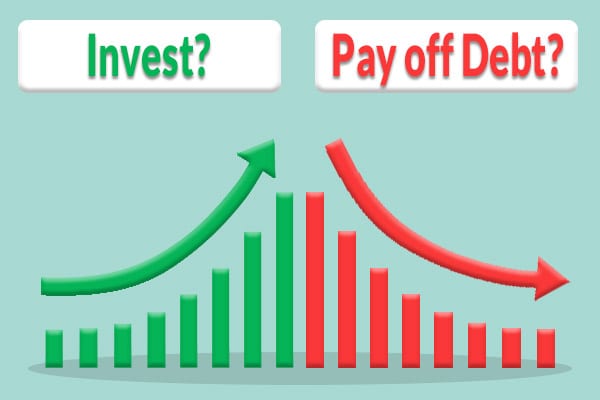
Should You Pay Off Debt or Invest? Experts Weigh In | In Charge
The decision to sell stock to pay off debt is a significant financial consideration that requires careful analysis. Debt can be burdensome and impact your financial well-being, and stock investments can offer the promise of financial stability in the future.
Considering these tradeoffs, it’s essential to evaluate the potential consequences and benefits before making such a decision.
Today we’ll delve into the key factors you should consider when contemplating whether to sell stock to pay off debt.
Considerations When Looking to Pay Down Debt
Unfortunately, there isn’t a cut and dry answer to whether or not someone should sell their investments to pay down their debt. However, there are some guiding principles and questions we can ask ourselves to help assess whether we should focus on investing in the stock market or prioritize becoming debt free.
Here are some of the most important considerations individuals should ask themselves when looking to invest or pay down their debt.
Assessing the Debt
Before making any decisions, it is crucial to evaluate the nature of your debt. Start by categorizing your debts into different types, such as credit card debt, student loans, or personal loans.
Assess the debt’s interest rate, terms, and conditions associated with each. It is particularly important to compare the interest rates on your debts with the expected returns on your stock investments. By doing so, you can gain a clearer understanding of whether selling stock would be financially advantageous.
Evaluating Your Stock Investments
Next, examine your investment accounts and understand their current value and potential future performance. Consider the type of stocks you own, their historical performance, and any ongoing developments within the companies.
Are you invested in stable, dividend-paying stocks, or are you holding volatile, growth-oriented stocks? Assessing the potential risks and rewards associated with your stock portfolio can help you determine whether these investments should be held or sold.
Investing always presents the risk to lose money and those who have too high of a risk profile in their stock portfolio can definitely consider selling a portion of their investment account to help pay down debt.
Analyzing Financial Goals and Time Horizon
Consider your financial goals and the timeframe within which you aim to achieve them. Determine whether selling stock to pay off debt aligns with your long-term objectives.
If your debts are impeding your ability to meet other financial goals or negatively affecting your creditworthiness, it might be worth prioritizing becoming debt free..
On the other hand, if you have a long investment horizon and your stock investments have strong growth potential or are generating significant income, it might be more prudent to maintain your positions and explore alternative debt repayment strategies.
Tax Implications
Selling stocks can have tax implications, so it is vital to understand how the proceeds will be treated.
Investment gains can lead to capital gains tax when selling stocks. Depending on your tax bracket and the length of time you have held the stocks, the tax liability may vary.
Consult with a tax professional to gain clarity on the specific tax implications associated with your stock sales. Understanding the tax consequences will enable you to accurately calculate the net impact of selling your stocks to pay off debt.
Diversification and Risk Management
Maintaining a diversified investment portfolio is a fundamental principle of sound financial management. Selling stocks to pay off debt may compromise your diversification, especially if you have a significant portion of your assets allocated to stocks.
It is crucial to assess the overall risk exposure of your portfolio and consider whether selling stocks would undermine your risk management approach.
Opportunity Cost
Consider the opportunity cost of selling stock to pay off debt. Selling your stock investments means forfeiting potential future gains.
If your stocks have consistently outperformed the interest rates on your debts, it might be financially more beneficial to keep your investments and explore alternative debt repayment strategies.
By evaluating the potential returns you could forego, you can make a more strategic decision about selling stocks to pay off debt.
Alternatives to Selling Stock
Finally, explore alternative options to address your debt situation. For instance, you could focus on making more money and improving your cash flow, reducing expenses, or negotiating with creditors to lower interest rates or establish a more favorable repayment plan.
Additionally, consider refinancing your debt obligations or consolidating high-interest loans into a single, more manageable payment (called a debt consolidation loan). By exploring these alternatives, you may find a more optimal solution that allows you to retain your stock investments while effectively managing your debt.
Different Kinds of Debt (and the best way to pay off debt for each)
When considering different types of debt, individuals often wonder whether selling their investments is a viable strategy to pay down this debt quicker. In this section, we’ll explore various debt categories and discuss whether it is advisable to sell investments to tackle each type.
Credit Card Debt

Almost half of America now carrying credit card debt, and more of it | CNBC
Credit card debt is notorious for its high-interest rates, often making it financially burdensome. Selling investments to pay down credit card debt can be a prudent choice for several reasons.
Firstly, the interest rates on credit card debt typically far exceed the potential returns from most investments.
By selling investments and using the proceeds to pay off credit card debt, you can effectively eliminate the ongoing interest charges and save money in the long run.
Additionally, credit card debt is usually unsecured, meaning there is no underlying collateral tied to it. This lack of collateral makes it a riskier form of debt, further supporting the argument for prioritizing its repayment.
Student Loans

How to find alberta student loan number | QCT College
Student loans are a common financial obligation for many individuals, and deciding whether to sell investments to pay them off requires careful consideration.
Unlike credit card debt, student loans often come with relatively lower interest rates. Additionally, certain types of student loans, such as federal loans, may offer borrower-friendly features, such as income-driven repayment plans and forgiveness options.
Before selling investments to pay off student loans, evaluate the interest rates on your loans and compare them to the potential returns from your investments.
If the interest rates on your student loans are relatively low, and you expect your investments to generate higher returns over time, it may be more beneficial to continue investing and make your regularly scheduled loan payments.
Mortgage Debt

Mortgage-debt forgiveness preventing foreclosures – Jun. 22, 2012 | CNN
Mortgage debt represents a substantial financial commitment for homeowners. While selling investments to pay off mortgage debt might seem appealing, it is essential to assess the potential benefits and drawbacks.
Firstly, mortgages often come with lower interest rates compared to credit card or personal loan debt. Additionally, mortgage interest payments may be tax-deductible, further reducing the effective interest rate.
If the interest rate on your mortgage is reasonably low, it may be financially advantageous to keep your investments and focus on building equity in your home. However, if you anticipate financial difficulties or high-interest rates on your mortgage, selling investments to pay down the mortgage could provide long-term stability and reduce interest expenses.
Auto Loans

Is a Subprime Auto Loan Crisis Brewing? | Knowledge at Wharton
Car loans are another common form of debt that individuals face when purchasing a vehicle. When considering whether to sell investments to pay down a car loan, several factors come into play.
Start by evaluating the interest rate on your car loan. If the interest rate is relatively low, it may be more beneficial to continue making regular loan payments while retaining your investments. However, if the interest rate is high or if you are struggling to meet the monthly payments, selling investments to pay off the car loan may provide financial relief and reduce the overall debt burden.
Additionally, consider the value of your vehicle. If the car’s value is significantly depreciating, selling investments to pay off the loan could be a prudent choice to avoid being “upside down” on the loan.
Deciding whether to sell investments to pay down different types of debt requires a careful evaluation of the specific circumstances. When it comes to credit card debt, selling investments is often a the correct choice due to the high-interest rates and lack of underlying collateral.
For student loans, weighing the interest rates against the potential returns from investments is essential to make an informed decision. As well, consider your future earning potential as you finish your education, focusing on increasing your annual salary may be the better decision as opposed to selling your investments.
When considering mortgage debt, it is crucial to consider the interest rate, potential tax benefits, and your overall financial situation. As with any financial decision, it is advisable to consult with a financial advisor or professional who can provide personalized guidance based on your individual circumstances.
Conclusion

Paying Off Debt? First Celebrate then Do THIS Now! | New Retirement
Making the decision to sell stock investments to pay off debt is a complex and individualized choice that requires careful consideration of multiple factors. Throughout this article, we have examined the pros and cons of selling investments to pay down different types of debt, including credit card debt, student loans, mortgage debt, and car loans.
Ultimately, the decision to sell investments to pay off debt should be based on an individual’s specific financial situation, risk tolerance, and long-term goals. It is crucial to consult with a financial advisor or professional who can provide personalized guidance tailored to your unique circumstances. As well, individuals can look into creating a debt consolidation loan to help create a more stabilized interest rate and simplify their debt-repaying process.
Remember, selling investments should not be undertaken lightly, as it can have long-term implications for your financial future. Maintaining a balanced investment portfolio, diversifying your assets, building an emergency fund, and exploring alternative debt repayment strategies are also essential aspects of sound financial management.
In conclusion, carefully evaluate the interest rates, risks, and potential returns associated with your debts and investments before deciding to sell stock to pay off debt. Consider the long-term impact, consult with professionals, and make the decision that not only aligns with your financial goals and circumstances, but also gives you peace of mind that you’re in control of your financial situation.
